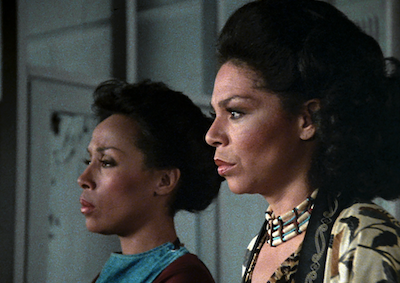Note: Due to an event in the Hammer Museum courtyard, the Lindbrook Dr. entrance to the museum will be temporarily closed. Please use the entrance on Wilshire Blvd. or through the parking garage.
Admission is free. No advance reservations. Your seat will be assigned to you when you pick up your ticket at the box office. Seats are assigned on a first come, first served basis. The box office opens one hour before the event.
Before the screening in the lobby, beginning at 6:30 p.m., UCLA Library Performing Arts Curator Miki Bulos will display a selection of stills and other archival materials related to superstar Diahann Carroll from UCLA Library Special Collections.
Sister, Sister
U.S., 6/7/1982
Diahann Carroll, Rosalind Cash and Irene Cara star as the Lovejoy sisters in this television film that tracks the fissures within a North Carolinian Black family bonded and broken by the relationship with their church and a legacy of migration between the South and North. Written by Maya Angelou, who was under contract with Twentieth Century-Fox, Sister, Sister was initially developed by Peter Andrews, vice president of special projects at NBC, in 1978, as part of the NBC Theatre prestige drama series. Andrews, who at the time was one of the few Black television executives, described the project as “Maya’s black-Americanization of Chekhov.”
During an era when television dramas featuring Black casts were rare, anticipation for Sister, Sister was high. The program was completed in 1979 and sat on the shelf at NBC until it finally aired in 1982. “Black drama remains the invisible man for all seasons on commercial TV,” lamented critic Howard Rosenberg, advocating for the program in the Los Angeles Times, “especially when it comes to stories about middle-class blacks.” The white, conservative, Mississippi-based Coalition for Better Television launched a boycott of the show, claiming that it portrayed “negative stereotyping of Christian people.” Support from viewers and critics poured in, and the TV movie’s ratings saw a bump from the controversy.
During the 1970s, Angelou was prolific as she worked across publishing, theater, film and television media platforms. However, commercial filmmaking and network television were especially challenging for the author. “Everyone and his dog has a chance to pick at a writer’s work,” remarked Angelou, who was accustomed to working with a single editor. While she had fought with the director over script and producing credits, Angelou’s vision of a complex trio of siblings thrives in melodrama’s emotional terrain of jealousy, dysfunction and family love and reconciliation.
—Archive Research and Study Center Officer Maya Montañez Smukler, author of “I Know Why: Maya Angelou and the Promise of 1970s Hollywood,” Women and New Hollywood: Gender, Creative Labor, and 1970s American Cinema
DCP, color, 98 min. NBC. Production: Twentieth Century-Fox. Executive Producer: Irv Wilson. Director: John Berry. Screenwriter: Maya Angelou. With: Irene Cara, Diahann Carroll, Rosalind Cash, Robert Hooks, Paul Winfield. Special thanks to Amy Crismer, Clara Earthly.
Special thanks to our community partners: UCLA Department of English, UCLA SEIS Center for the Preservation of Audiovisual Heritage (CPAH), IS Library and Media Preservation Lab.






 Mobile Navigation
Mobile Navigation

